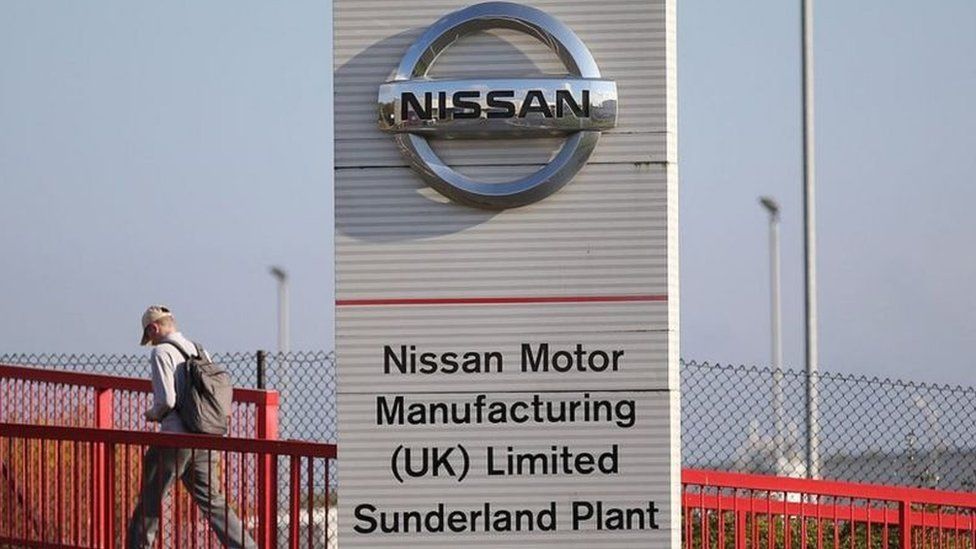Brexit: Nissan commits to keep making cars in Sunderland
- Published
- comments

Japanese car maker Nissan has told the BBC its Sunderland plant is secure for the long term as a result of the trade deal reached between the UK and the EU.
It said it will move additional battery production close to the plant where it has 6,000 direct employees and supports nearly 70,000 jobs in the supply chain.
Currently, the batteries in its Leaf electric cars are imported from Japan.
Nissan would not confirm if this would mean additional jobs at Sunderland, which is the UK's largest car plant.
Manufacturing the more powerful batteries in the UK will ensure its cars comply with trade rules agreed with the EU requiring at least 55% of the car's value to be derived from either the UK or the EU to qualify for zero tariffs when exported to the EU.
Some 70% of the cars made in Sunderland are exported and the vast majority of them are sold in the EU.
Nissan had issued stark warnings last year that if the UK left the EU without a trade deal, the resulting tariffs on cars and components would make the Sunderland plant "unsustainable".
Nissan's chief operating officer Ashwani Gupta told the BBC: "The Brexit deal is positive for Nissan. Being the largest automaker in the UK we are taking this opportunity to redefine auto-making in the UK.
"It has created a competitive environment for Sunderland, not just inside the UK but outside as well.
"We've decided to localise the manufacture of the 62kWh battery in Sunderland so that all our products qualify [for tariff-free export to the EU]. We are committed to Sunderland for the long term under the business conditions that have been agreed."
It came as Nissan paused one of its two production lines in Sunderland on Friday as disruption at ports caused by the pandemic affected its supply chain.
The company said the move would affect the line which produces the Qashqai and Leaf, but work would resume next week.
'Belief in Britain'
Business Secretary Kwasi Kwarteng welcomed the firm's endorsement of Sunderland as a manufacturing base.
"Nissan's decision represents a genuine belief in Britain and a huge vote of confidence in our economy thanks to the certainty our trade deal with the EU delivers," he said.
"For the dedicated and highly-skilled workforce in Sunderland, it means the city will be home to Nissan's latest models for years to come and positions the company to capitalise on the wealth of benefits that will flow from electric vehicle production."
It's particularly welcome after the more guarded comments from the boss of Vauxhall's parent company last week.
Speaking as the tie-up between Fiat Chrsyler and Peugeot Citroen was christened with new umbrella name Stellantis, boss Carlos Tavares said that the future of its Ellesmere Port plant depended on the support the UK government was prepared to offer after its decision to ban sales of new petrol and diesel cars after 2030.
"If you change, brutally, the rules and if you restrict the rules for business then there is at one point in time a problem," he said.
Looking forward, he said it would make more sense to locate an electric vehicle factory closer to the larger EU market.
Industry voices welcomed the news from Nissan but reinforced the message from Vauxhall's owners that the government needs to do more to secure the future of the car industry as it electrifies.
"This is obviously good news and will help the Nissan Leaf avoid any future tariffs, but we are going to need to see a lot more investment in battery production in the UK if we are to preserve the UK as a car manufacturer and exporter," said Professor David Bailey of Warwick University.
The head of trade body the Society for Motor Manufacturers and Traders agreed.
"The battery plant in Sunderland may be enough for Nissan's near-term plans to build tens of thousands of electric cars but the UK made 1.5 million cars last year and all will be partly electric by 2030," Mike Hawes said.
'Jobs at risk'
Andy Palmer, former boss of Aston Martin and current chairman of electric bus maker Switch Mobility, has gone further. He says that 800,000 jobs are at risk if the UK government doesn't act now to foster battery investment.
"Without electric vehicle batteries made in the UK, the country's auto industry risks becoming an antiquated relic and overtaken by China, Japan, America and Europe."
He urged the UK government to use every lever at its disposal to make the UK attractive.
UK car investment has fallen sharply since the UK voted to leave the EU.
In the five years to 2016 it averaged £3.5bn per year. In the four years since it has averaged around £1bn - a fall of 71% at a time when the technology and map of car production are going through their biggest revolution since the car was invented.
The Nissan decision is therefore a very welcome boost to the UK which is in an international scramble for the investment of the future which is happening right now.
- Published21 January 2021
- Published18 November 2020
- Published19 January 2021